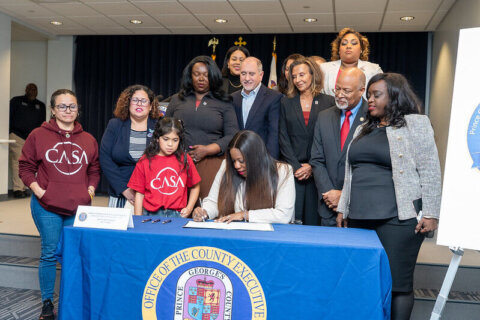This article was republished with permission from WTOP’s news partners at Maryland Matters. Sign up for Maryland Matters’ free email subscription today.
This content was republished with permission from WTOP’s news partners at Maryland Matters. Sign up for Maryland Matters’ free email subscription today.
Two freshmen lawmakers from Prince George’s County want to reverse the core of a 2013 law that fundamentally changed the structure of the county board of education. If successful, the move could significantly strip authority from County Executive Angela D. Alsobrooks (D), a potential 2022 gubernatorial candidate.
Dels. Julian Ivey (D) and Ronald L. Watson (D), in separate bills, want to eliminate the board’s four appointed seats and put the power of selecting full-term members exclusively back in the hands of voters.
The duo is also calling for the elimination of the school system’s Chief Executive Officer position, reinstating a school superintendent, and they want board members to once again determine who the chair and vice chair are. They also want to term out all appointed seats.
But for now, it doesn’t appear likely that either bill will move very far during this General Assembly session.
Currently, there are 14 members on the Prince George’s County Board of Education — nine elected district seats and four appointed at-large seats. All members serve four-year terms. A student member is named each year by the Prince George’s Regional Association of Student Governments.
The county executive currently has the authority to appoint the school board’s CEO and three of four appointed board members, fill vacancies, and determine the chair and vice chair. The county council selects the fourth appointed board member.
Alsobrooks, who last month replaced retiring board chair Alvin Thornton with Juanita Miller, a former state delegate and fixture in the Prince George’s political scene for more than three decades, did not respond to a request for comment. Alsobrooks also named Sonya Williams, a civil engineer, to serve as the vice chair.
In 2019, Alsobrooks appointed Dr. Monica E. Goldson, who had already been deputy superintendent and acting schools CEO, as the permanent CEO.
Thornton, a retired Howard University administrator and veteran educator, has recommended that the county study the school board’s current hybrid system, which has been in place since 2013. But some political leaders are ready to make changes.
“It’s very clear now with the majority of the board of education supporting the reform members of the board, that it’s past time to restore fully elected membership status, and all the powers that come with that, back to the board of education,” Ivey said in a telephone interview. “We should be allowing our board of education to have the authority they used to have, and that includes the authority to hire a superintendent/CEO.”
Ivey said the school board structure has been a contentious issue ever since the fully elected status was rescinded.
“This isn’t per se targeting our county executive or targeting the CEO of our public schools — this is about having a good government bill passed and allowing individuals to fully participate in their democracy,” Ivey said. “We’re not the only jurisdiction across the state looking to gain more democratic representation on our board of education. This is a good democracy bill, a good government bill.”

Watson, a former elected education board member from 2006 to 2010, said his bill was drafted at the request of a former school board member.
“I know what a good functioning school board looks like and what type of infrastructure they need to be successful,” he said. “I do not believe they have that” now.
In 2013, the Prince George’s County delegation sponsored sweeping legislation which significantly reduced the power of the elected school board. At the time, the school system was struggling.
The school superintendent position was eliminated and replaced with a school CEO position, appointed by the county executive (Alsobrooks’ predecessor, Rushern L. Baker III, was county executive at the time).
Watson believes the CEO position suggests the school system should be following a business model — and is too far removed from the everyday needs of the education system.
“The CEO is based on a business model, and what we know is that it is vitally important that the person who is running our school system has very deep roots steeped in education,” Watson said. “Honestly speaking, prior superintendents who tried to apply did not meet the criteria for superintendent, and the CEO actually reduces those requirements.”
Ivey’s and Watson’s bills are strikingly similar, but they break on some points.
Ivey is calling for nine-member, district-wide elections, repealing staggered terms, and scheduling special elections for vacancies.
Watson is calling for a nine-district board that is elected countywide, similar to Montgomery County’s board of education elections. He would like to let the county executive preserve the right to appoint the school superintendent and fill any vacant board seats.
Both bills would require board members to be residents of the district they are elected to.
And the lawmakers have displayed a willingness and desire to work together towards a larger goal of restructuring the education board.
“With respect to the county executive’s powers, I believe an elected board should have the ability to select their own leadership,” Watson said. “They have to work together day in and day out. I don’t think we need political appointees to interfere with that process.
“However, I do believe the county executive should continue to be responsible for the hiring and retention of the superintendent. That portion of the current structure is what has allowed us to have much better continuity with a superintendent, or a CEO in our case, to retain [the position].”
Watson said the bill would keep intact existing districts, but allow people from other areas of the county to vote in all districts.
“I was an at-large member and had to run across the county,” Watson said. “In doing so, I had a very good understanding of the entirety of the school system. Each board member needs to recognize that our school system will not succeed unless the entire system succeeds.”
Watson cited two schools in the district with vastly different success rates.
“Say this bill is not in place, the question is, why would someone who represents Eleanor Roosevelt, which is one of our better performing high schools, go inside the [Capital] Beltway and be concerned about Central High School?” Watson asked. “The folks inside the Beltway don’t elect him, so they really don’t have to care too much about that, but they need to. If you look at our school system, our most at-risk people are inside the Beltway, and all nine members need to be focused on the entirety of the school system.”
Theresa Mitchell Dudley, president of the Prince George’s County Educators’ Association, said the board’s current structure has been problematic, but it’s a small problem on a larger scale. PGCEA, the teachers’ union, represents 10,500 educators in the county.
“It has caused a great deal of consternation amongst those of us who believe we should have fully elected representation,” Dudley said in a telephone interview. “Our board has not taken a position officially on either bill. However, I have been very clear. In order to make our school system better together, the county stakeholders have to have a clear vision on how to protect our schools from the problems that have been plaguing them.”
Dudley cited the lack of a coordinated effort on the part of county stakeholders, including the county executive and the county council, “rampant residential development,” and school funding as major concerns.
“If we keep changing the board structure around without addressing the issues that surround protecting our schools, it really doesn’t matter,” Dudley said. “It doesn’t matter who is sitting in those seats when you don’t have enough money to fund those schools.”
Dudley said while she believes neither bill will advance this year, she worries about history repeating itself.
“They’re still alive,” she said. “What we saw several years ago, was they waited until the last minute of session and they came in and made significant changes. I am concerned about that.”
Watson said he is not worried if the legislation is delayed, for now.
“This is not an urgent issue,” he said. “This can be tabled and worked with more community input and resubmitted at a later date. Right now because of the special session and the impacts of COVID, trying to overturn the governor’s veto on Kirwan, that bill can be put on hold. We have more important things that we can deal with at this time.”
Both bills will come before the House Ways and Means Committee — but they haven’t had a hearing or a vote in the county House delegation, and they are unlikely to move without one.
Del. Alonzo Washington (D-Prince George’s), the Ways and Means vice chair, said the future of Ivey’s and Watson’s legislation is unknown.
“That’s still up in the air,” Washington said. “We haven’t even had a public hearing yet.”
Glynis Kazanjian is a freelance writer. She can be reached at glyniskaz@gmail.com.







